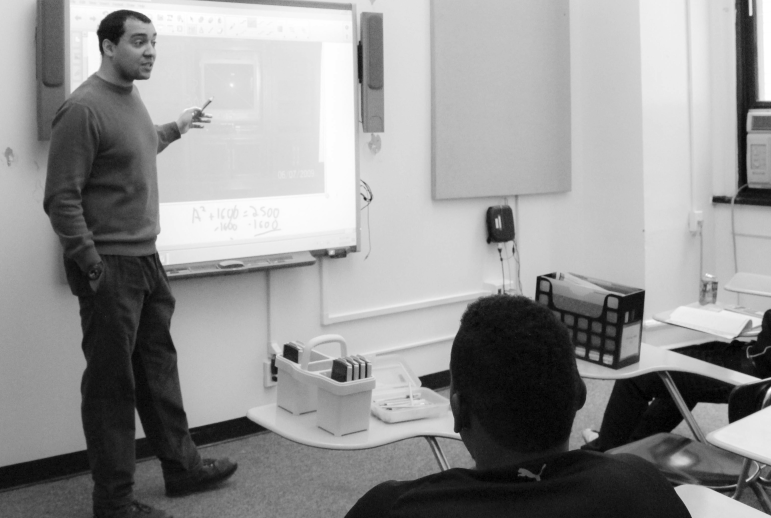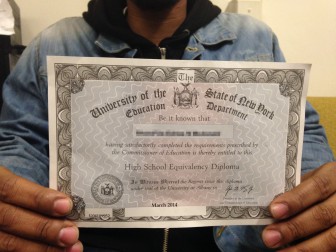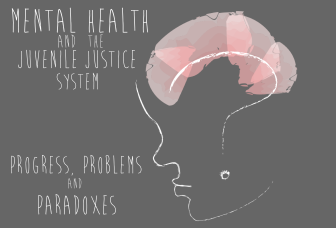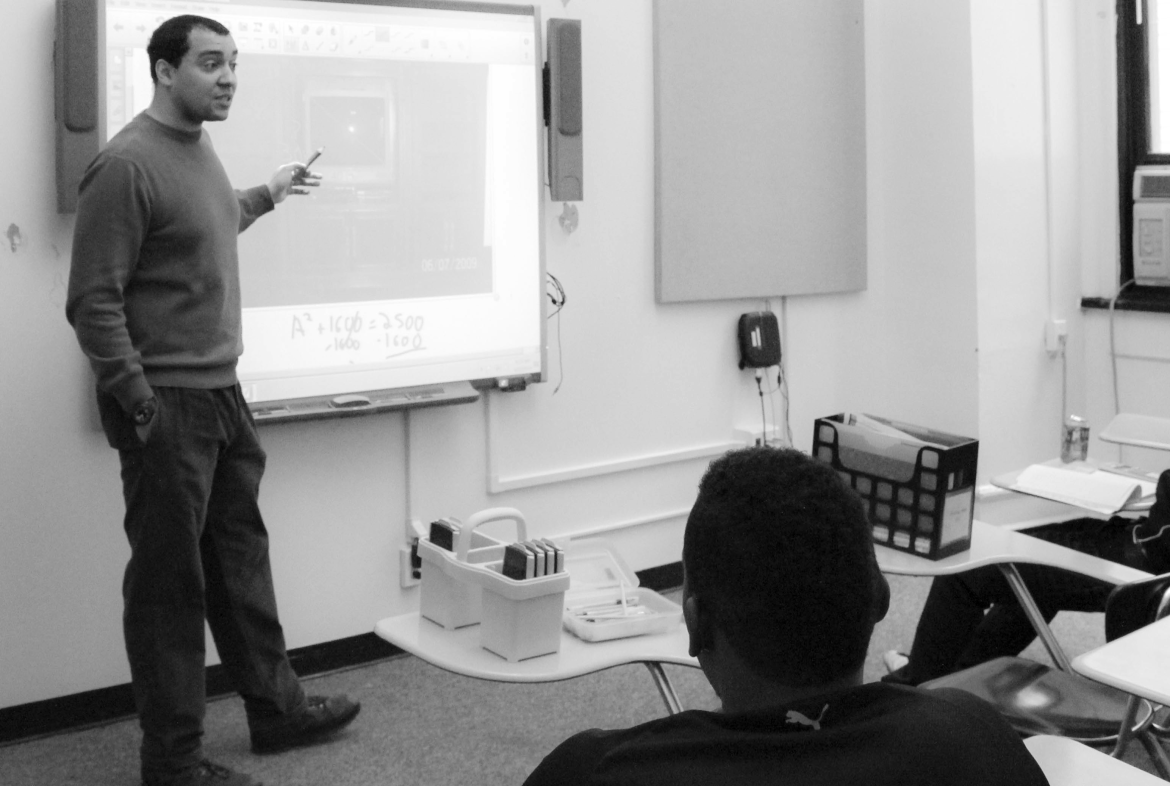
Justice Scholars enrolls about 40 students each year. While still in its early stages, 55 participants have graduated so far
It was sophomore year in high school when Shond’Ue* said his fits of fury became more frequent. Arguments with his teachers and fistfights with students resulted in suspensions and multiple arrests that he wasn’t comfortable mentioning.
Shond’Ue admits that he spent his teen years struggling with substance abuse. Just marijuana, he emphasized. He said he was never ever affiliated with any gangs, but his moody demeanor often made him confrontational.
“Most of my arrests was for fighting. I was always having problems at home and at school,” he said. “At that point in my life nothing was going right.”
About a year ago, Shond’Ue, now 24, decided that the cycle of repeated lock-ups needed to come to an end. His probation officer suggested that he enroll in the Young Adult Justice Scholars — a GED program run by the Center for Alternative Sentencing and Employment Services (CASES), one of the largest alternatives to incarceration organizations in the city.

The six-month program is a “one-stop-shop” for at-risk youth to earn their GED.
CASES is one of six nonprofits that facilitate the program that allow at-risk teens to get their life back on track. Justice Scholars started two years ago, part of then-Mayor Bloomberg’s Young Men’s Initiative to reverse the school-to-prison pipeline.
For Shond’Ue, becoming a Justice Scholar would not only be a shot at redemption and his last chance to graduate from high school, but a place where he would finally get counseled through a mentally disturbed past.
“The therapist here referred me to go see a psychiatrist — that’s when I got diagnosed with bipolar disorder.”
“I always had real bad anger issues,” he said.

Katy McCarthy / JJIE
Read more from the series: Mental Health and the Juvenile Justice System: Progress, Problems and Paradoxes.
Much of his bad temperament stemmed from being exposed to domestic violence at a young age.
By the time Shond’Ue turned 15, his anger had blossomed into rage. Never again would he stand tucked in the corner of the living room in his parents Harlem apartment and watch his mom get beaten by his father.
“Every weekend he was always drinking and would fight with her,” he recalled. “One day he came in and thought he was just gonna hit my mom — that’s when we started fighting.”
What seemed like a lifetime ago, Shond’Ue described how the unbreakable bond he and his mom once shared turned into an acrimonious relationship after his father left.
“When she got a boyfriend, she would always put him before her kids. I had to take care of my little brothers and make sure they had a hot meal every night,” he said. “One day we got into an altercation and I punched a hole in her apartment wall, so she pressed charges against me.”
Lisa Faro, the program director said Shond’Ue’s childhood echoes the stories of many young men and women at Justice Scholars. Faro arranged for Shond’Ue and other participants to be interviewed on the condition that their last name would not be published.
“These kids are coming from different neighborhoods and different gangs,” Faro said. “Programs like ours are saying that we want to give you the opportunity to do better.”
Faro, a former probation officer in the South Bronx, said the six-month program is a “one-stop-shop” for at-risk youth to earn their GED, gain exposure to professional careers and other resources that wouldn’t be available to them in their neighborhood schools.
“Kids come in here with special needs and don’t even know it,” Faro said. “We are able to offer resources that traditional schools aren’t able to provide, or don’t have time to because of the several hundred students they have.”
Mastering basic math and reading skills after being out of school for six years was a new challenge for Shond’Ue, but he said that didn’t discourage him. He spent most of his time at Justice Scholars getting tutored three times a week.
“I knew someone would always be there to help me. Justice Scholars became like my family,” he said. “They were able to give me everything that I wasn’t getting at my high school.”
CASES teacher Maceo June credits the relatively small class sizes for helping students be more attentive.
“Typically, we have about eight students in a classroom. For most of them it’s easier to focus and get that one-on-one attention when they need it,” June said.
Justice Scholars enrolls about 40 students each year. Most participants are in their late teens, several grade levels behind and unlikely to return to a regular high school once their cases are sealed.
In fact, two-thirds of juveniles released from jail do not return to school in the community, according to the Citizens Crime Commission of New York City. Studies have shown that alternative to education programs eases the transition from confinement back to school.
Tim Lisante, the superintendent for the New York City Department of Education was the former principal at East River Academy — a school for incarcerated youth on Rikers Island. Lisante said the city is currently working with the chancellor on a proposal for high school re-entry.
“We have developed resources that has helped students readjust, but we still have a long way to go,” he said. “One thing we need to start paying more attention to is the after-care support once they leave the justice system.”
Rodolfo, 22, served an eight-month prison sentence before starting Justice Scholars. After several arrests he said that going back to his high school only led to bad choices and bad crowds.
“I wanted to get my GED and go to college, so I had to try something new,” he said.
While Justice Scholars is still in its early stages, 55 participants have graduated so far — some are enrolled in community colleges, others have been placed in jobs with partner organizations of the program.
Shond’Ue received his degree in March and is now working part-time doing construction.
“I always like working with my hands,” he said with a laugh. “I can put them to better use now.”
*Shond’Ue's full name was not used at his request.
Financial supporters of The JJIE may be quoted or mentioned in our stories. They may also be the subjects of our stories.


GREAT… NOW WHO IS GOING TO HIRE SEX OFFENDERS EVEN AFTER ALL THAT SCHOOLING.
Dear Mr. Glenn, It is unfortunate that after reading this article, you assumed that 1. we only work with sex offenders and 2. that you have not educated yourself on the sex offender laws. There are young men, aged 18 that are charged with sex offenses when having sex with a 16-17 year old female that was consensual but the parent files a complaint due to person being a minor. You also have not taken into consideration that although there is a 2 year age difference, they can potentially be in the same grade in highschool which makes it harder to see the age difference/maturity etc. We believe in rehabilitation and second chances but more importantly in educating ourselves about the systems and its flaws. In addition, we take into consideration the charges of those to make sure it is a good fit with our team. I do not make excuses for anyone’s behavior, but I do know that if we all had a stream of thought like the comment above there would be no hope to change. I hope you have a great day. We are not for everyone and we are ok with that 🙂
Pingback: Justice Scholars Enables At-Risk Teens to Get Back on Track -